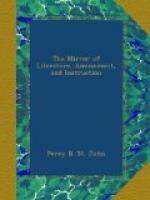As much grace and dignity was displayed in our reception as such a figure could show, and chairs were placed by the attendants for our accommodation. He waddled a short distance, and, notwithstanding the exertion was so extraordinary as to cause large drops of perspiration to roll down his face, conferred a great honour upon us by personally accompanying us to see a tank he had just formed for fish, and with a flight of steps, for the convenience of bathing. After viewing this, he returned to his former station, when he re-seated himself, with a dignity of look and manner surpassing all description; and we took our departure, after a brief common-place conversation.
I remarked, that on his approach the natives squatted down, as a mark of respect: a custom similar to which prevails in several of the Polynesian islands.
Mr. G.B.’s MS. Jour., Nov. 15, 1830.
[1] Singapoor is derived from Sing-gah, signifying to call or touch at, bait, stop by the way; and poor, a village (generally fortified), a town, & c.—(Marsden’s Malay Dictionary). It is considered at this island, or rather at this part of the island where the town is now situated (the name, however, has been given by Europeans to the whole island), there was formerly a village, inhabited principally by fishermen. The Malays, who traded from the eastward to Malacca, and others of the ports to the westward, touched at this place. Singa also signifies a lion (known by name only in the Malay countries), from which the name of the island has been (no doubt erroneously) supposed to be derived.
[2] Kampong Glam, near Sincapore,
has its flame derived, it is
said, from Kampong, signifying
a village; and Glam, the name of
a particular kind of tree.
* * * * *
MANNERS & CUSTOMS OF ALL NATIONS.
ROYAL AND NOBLE GLUTTONY.
(For the Mirror.)
The Emperor Claudius had a strong predilection for mushrooms: he was poisoned with them, by Agrippina, his niece and fourth wife; but as the poison only made him sick, he sent for Xenophon, his physician, who, pretending to give him one of the emetics he commonly used after debauches, caused a poisoned feather to be passed into his throat.
Nero used to call mushrooms the relish of the gods, because Claudius, his predecessor, having been, as was supposed, poisoned by them, was, after his death, ranked among the gods.
Domitian one day convoked the senate, to know in what fish-kettle they should cook a monstrous turbot, which had been presented to him. The senators gravely weighed the matter; but as there was no utensil of this kind big enough, it was proposed to cut the fish in pieces. This advice was rejected. After much deliberation, it was resolved that a proper utensil should be made for the purpose; and it was decided, that whenever the emperor went to war a great number of potters should accompany him. The most pleasing part of the story is, that a blind senator seemed in perfect ecstacy at the turbot, by continually praising it, at the same time turning in the very opposite direction.




